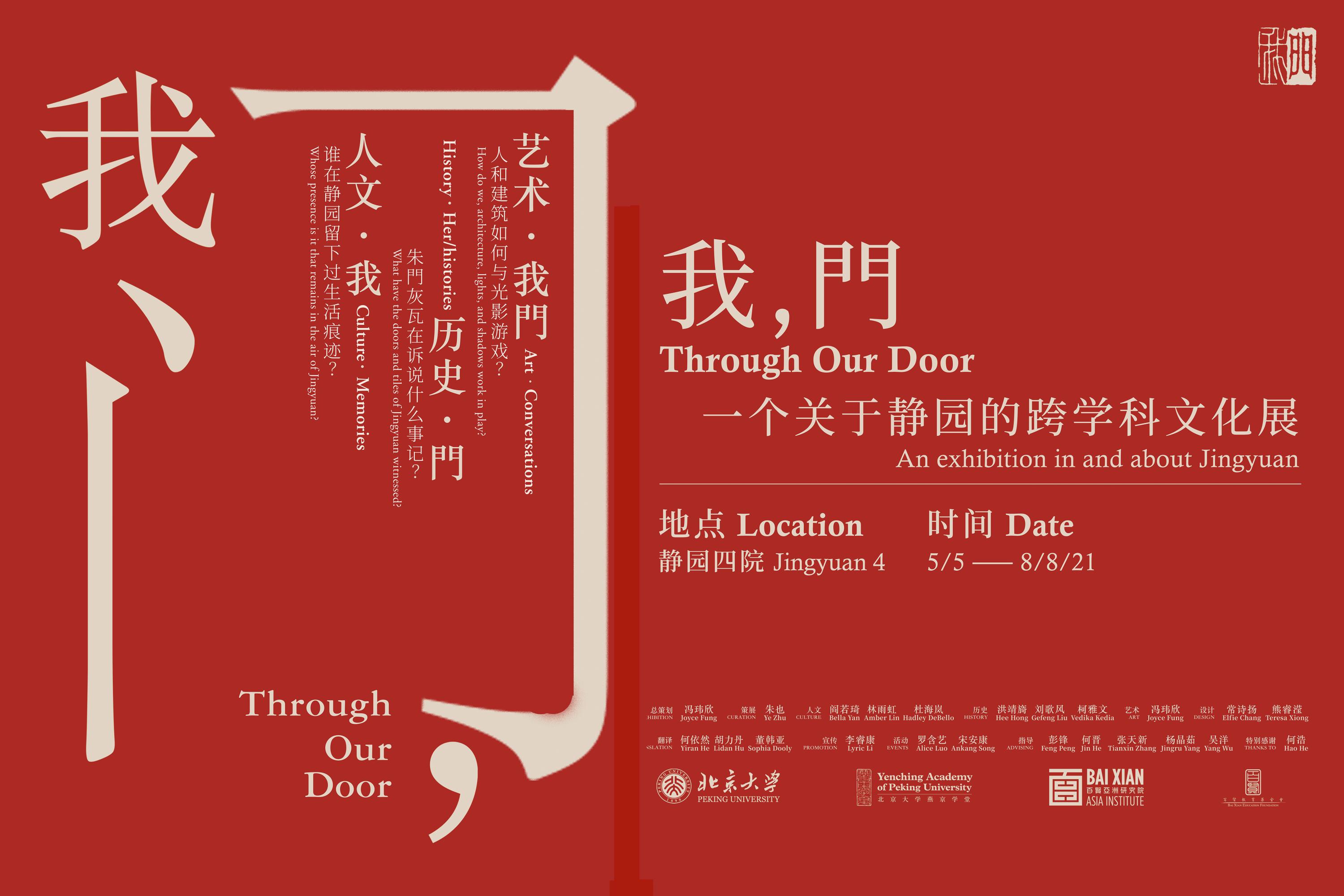Dr. Yunjia Wang is a professor in the Department of Chinese Language and Literature at Peking University. She specializes in the field of phonetics, particularly on the study of Chinese phonetics and phonetic acquisition of Chinese as a second language. Professor Wang feels a deep emotional attachment to Jingyuan. She recalled one story after another, one memory after another: from doing laboratory research late at night for her doctoral dissertation, to preparing a 70th birthday celebration for her doctoral supervisor and tutor, (Professor Tao Lin), to mourning in Jingyuan Courtyard 5 after Professor Tao Lin passed away.
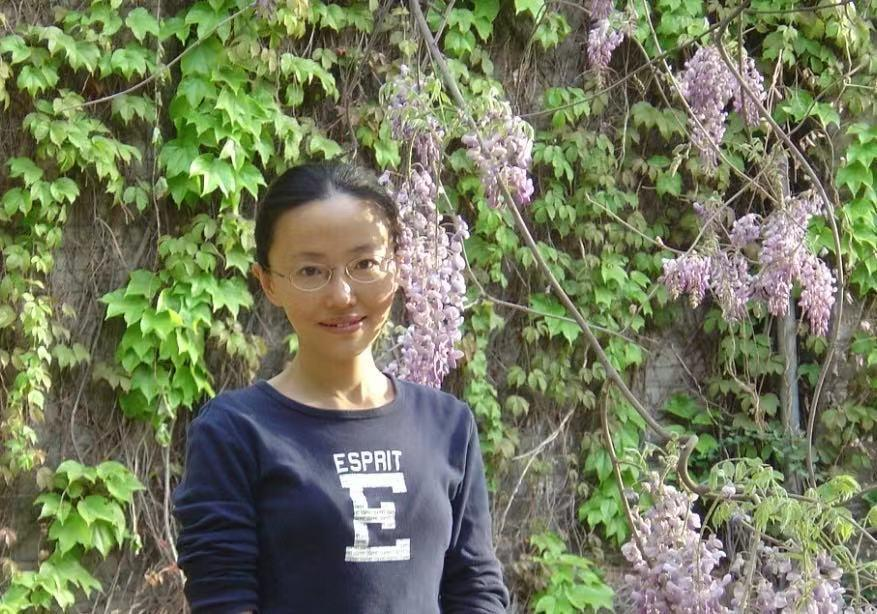
Q: Do you remember the first time you visited Jingyuan? What was your first impression of Jingyuan?
A: I do not remember an exact date, and there are two possibilities. One possibilty is when I first applied to enroll as a Ph.D candidate at Peking University. At the time, all Ph.D applicants had to take an on-site examination at Peking University as well as go to the Department of Chinese Language and Literature, located in Jingyuan Courtyard 5, to handle some administrative formalities. Another possibility is that after I enrolled, when I first met my doctoral supervisor, other professors, and other students in the laboratory because my concentration was laboratory phonetics.
Q: What will you have if you would describe Jingyuan in three words?
A: Well, it is quite difficult to summarize it in so few words. Jingyuan is classically elegant while also simple in its entirety. Jingyuan now is completely different since when I first saw it, when it was centered around a little wood. While I cannot find the third word, I would describe it as a combination of classical and simple.
Q: Did anything particularly interesting or unforgettable happen in Jingyuan when you were a student?
A: I have quite an emotional attachment to Jingyuan. My academic focus, phonetics, is regarded as a science categorized in the fields of humanities and social sciences. Since I was a student, the field has changed. Now, phonetic analysis can be done using software at home, while back then it was necessary to go to the laboratory to take measurements and analyse data. As a result, I spent a lot of time at the Department of Chinese Language and Literature in Jingyuan 5, taking my core classes or working on my doctoral dissertation. I still remember that the room on the western end of the second floor of Jingyuan 5 was the phonetics laboratory, with a row of windows facing west, through which one could see the small wood in the yard.
To be honest, I didn’t pay much attention to Jingyuan and its surroundings at first. While I was a student, I was preoccupied with my heavy study load and didn’t care much for such considerations. Then a linguist from the Netherlands, J. H. V. Hoek, arrived to carry out a collaborative research project with Professor Jiong Shen, the director of the phonetics laboratory. Professor Shen gave J. H. V. Hoek the Chinese name of ‘Danhu Feng.’ As he was here by himself and did not have much to do, he spent a lot of his time in the laboratory. Once I asked him, “Professor Feng, every day I see you standing there staring out the window—what are you looking at?” He replied, "Do you not think this room has a scenic view? Look at how beautiful the gardens are down there and across the way, in Jingyuan 1, 2, and 3.” I looked outside the window and for the first time, recognized Jingyuan’s beauty. It happened to be autumn at the time, and the leaves in Jingyuan were just starting to turn yellow. The view gave me the impression of simplicity and elegance, as well as a hint of the season’s bleakness. Upon fully appreciating Jingyuan’s beauty, I thought to myself: How amazing it is that the Department has such a wonderful view!
Here is another anecdote. You could always find geckos on the walls of Jingyuan Courtyard 5, who fed on the mosquitoes and other insects hidden under the surrounding vegetation. These geckos often laid motionless around the windows facing west. Professor Feng most likely had never seen a gecko and when he first saw one, he was quite surprised, exclaiming, “These little geckos seem to be staring straight at us through the windows! Don’t you find them really adorable?”
I was a doctoral student at Peking University from 1990 to 1993. There were fewer people on campus then, and not many people noticed Jingyuan. At that time, wisteria flowers would bloom every spring in the yards. Because Jingyuan was full of vegetation, we would see blossoms in the spring, fruits in the summer, and could harvest them in the autumn. Jingyuan experienced this seasonal rotation every year, but in the past, not many people paid attention to it. Nowadays, as people are becoming less preoccupied with their material needs, they can slowly spend more time taking interest in these things.
What I remember most clearly is the last year of my Ph.D student life. Unlike the four-year Ph.D courses nowadays, we had to complete all the research and courses in only three years, and thus the last year was difficult. I often left the laboratory at midnight. Streetlights were barely working then, and it was so dark that I usually took a flashlight with me. But I, working alone in the room, still could not shake off the fear that there were some non-Peking University temporary residents talking outside in the dark. One night, I had to complete all of the analysis nonstop, but the computer worked so slowly that it was nearly 1 o’clock in the morning by the time all the work was done. I went back to the dormitory, only to not find any of my roommates, the girls living next door or opposite from me. Later they told me that they had all been so worried about me that they had decided to go outside and find me together. However, they became lost because they were not students of the Department of Chinese Language and Literature and thus were not familiar with Jingyuan. The story at the time left me with a very deep impression. At Jingyuan 5, I also completed my Ph.D thesis defense. After that, we took a group photo.
My stories go beyond these: my tutor, respected Professor Tao Lin and his wife Rong Du were graduates from Yenching University, where they met each other and then married. Jingyuan buildings were used as female dormitories back in the Yenching University era. Mrs. Du used to live there. When I enrolled, Professor Lin’s house in Yannanyuan 52 was really close to Jingyuan’s Department of Chinese Studies.
We used to hold weekly meetings for all laboratory members. One time, a female upperclassman discovered that it happened to be Professor Tao Lin’s 70th birthday, and the professor had not planned to let us know. She asked us to buy a birthday cake in the Youyi Store without the professor knowing. We then celebrated Professor Lin’s birthday together. He was so surprised and very pleased as well. Professor Shen took his camera and captured a few moments, including when Professor Lin blew out the candles. That was one of the most touching moments of my memories of Jingyuan.
I miss the old days as a student when we could purchase fresh fruits, such as apples and peaches, picked from trees in Jingyuan. Now the wood have turned into grass, with neither flowers nor fruits.
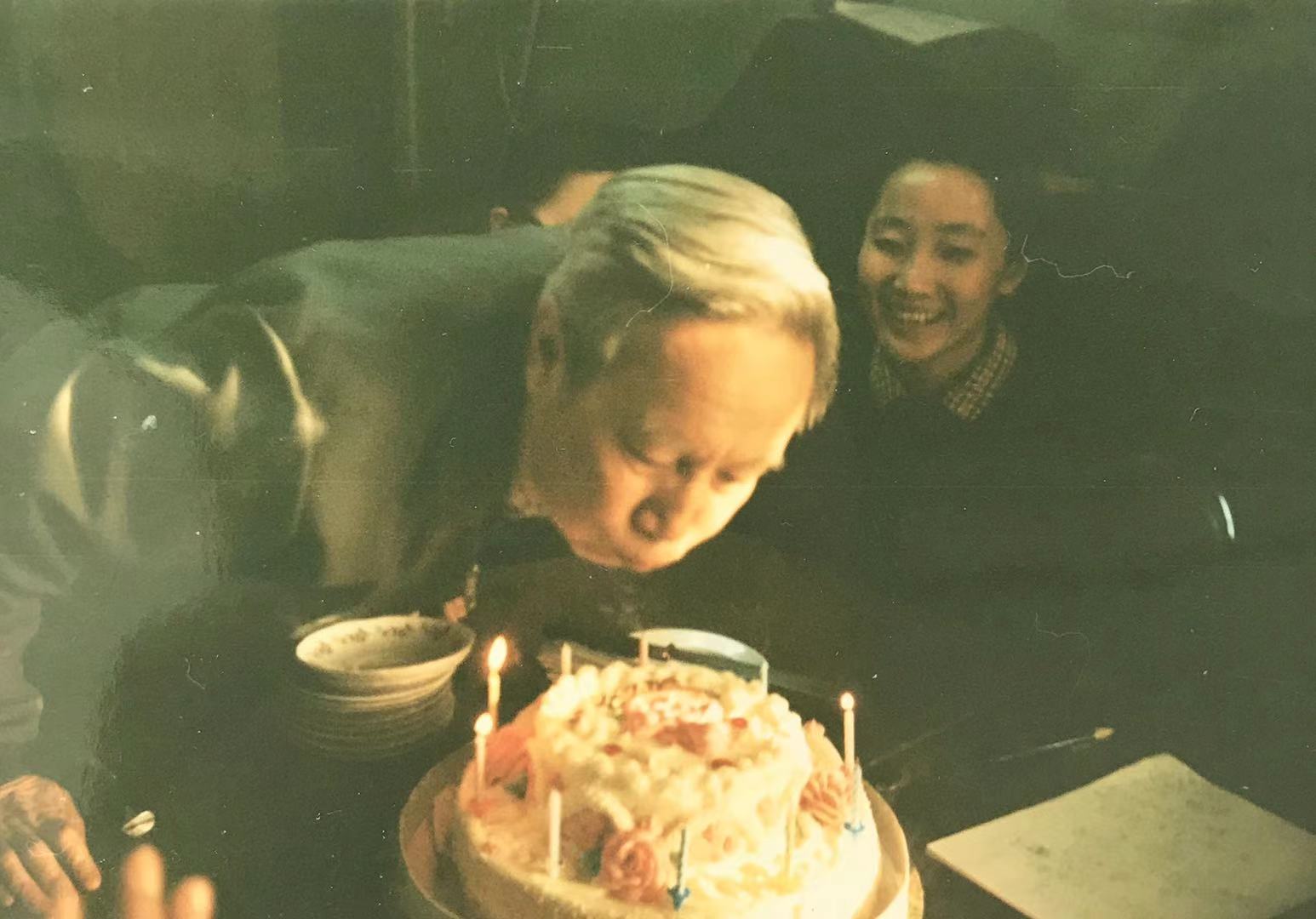
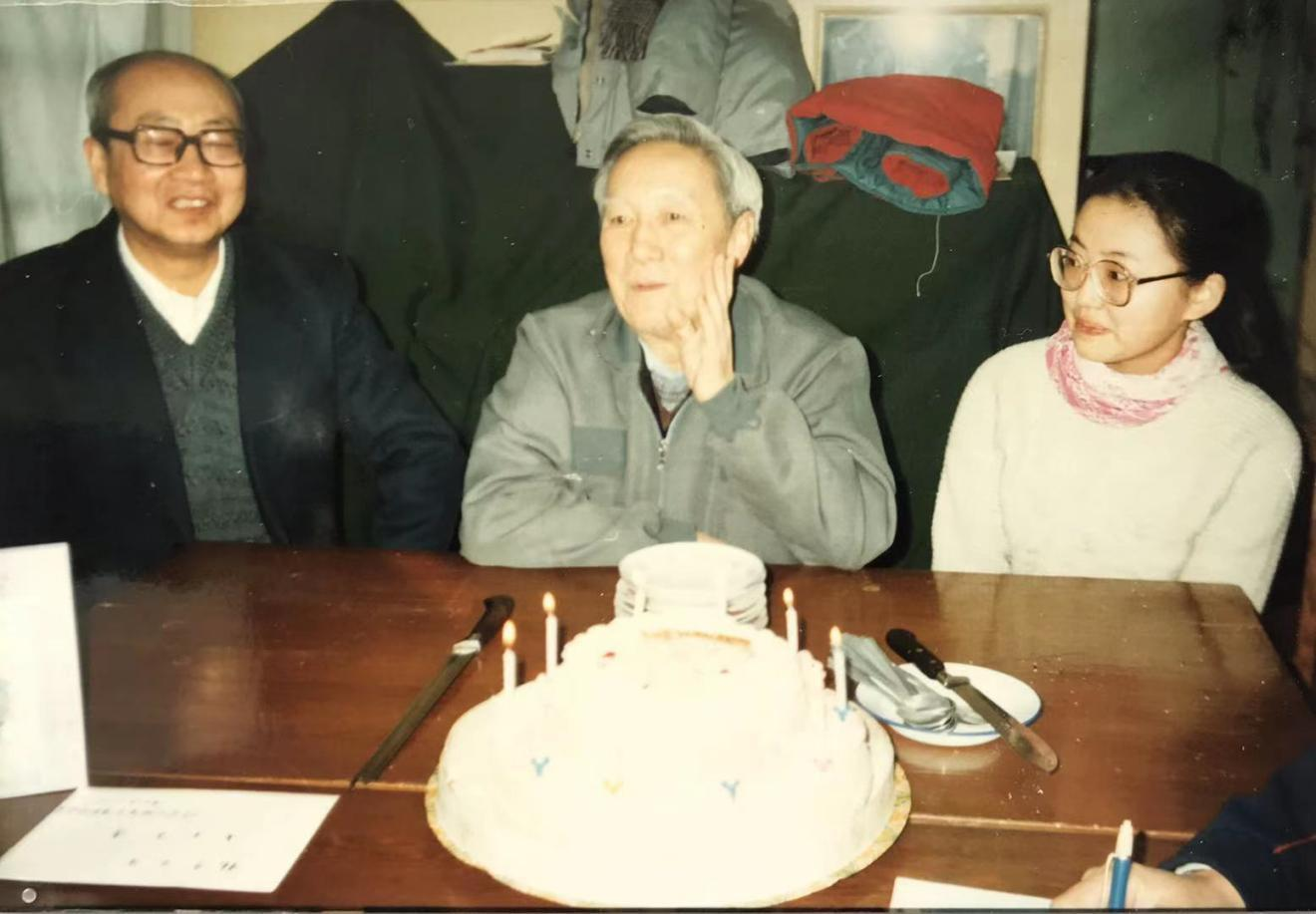
Professor Tao Lin’s (middle) 70th birthday, Professor Lijia Wang (left, deceased) and Ph.D student Yunjia Wang (right)
Q: How do you feel about the changes to Jingyuan, as you have grown from a student to a professor here?
A:I just take these changes as natural and have no strong feelings about them. Just as when Peking University became a free venue for visitors, Jingyuan has also become a popular tourist site. I feel very proud that I finished my Ph.D courses and set about my life in such a fascinating place. Later, the department moved to Lee Shau Kee Humanities Hall, which had more space and was more convenient than Jingyuan. We even had our own individual workspaces. But I still felt sorry about the fact that the Department of Chinese Language and Literature left Jingyuan and that we had lost the building, which had best represented the character of our branch for so long. With that same feeling, every time I walk through Yannanyuan, I cannot take my eyes off of Yannanyuan 52, where Professor Lin used to live. I visited the building almost every week during my Ph.D years when he reviewed each of my paper sections as soon as they were finished. Now I feel the connections between Jingyuan, Yannanyuan and myself have been cut. This makes me feel a little sad.
Q: Was there anything unforgettable when you worked there?
A: I did not feel anything special as a faculty member, but when I heard about Professor Lin’s death, it shocked me that he had died so abruptly. In the years afterwards, I often had dreams that his death was a lie. Every time I rode into campus and saw an old man with white hair in the front, I always wanted to pass by to see if that was him. Eventually I realized that Professor Lin had gone. We used a meeting room in Jingyuan 5 as the mourning hall, filled with flowers sent from people from everywhere. People flooded the hall to mourn him. I then remembered that we had lost three professors that year, and we mourned them in the same way. The Department also set the room as a mourning hall for those three other professors, to let others come visit. That was the most painful moment for me at Jingyuan.
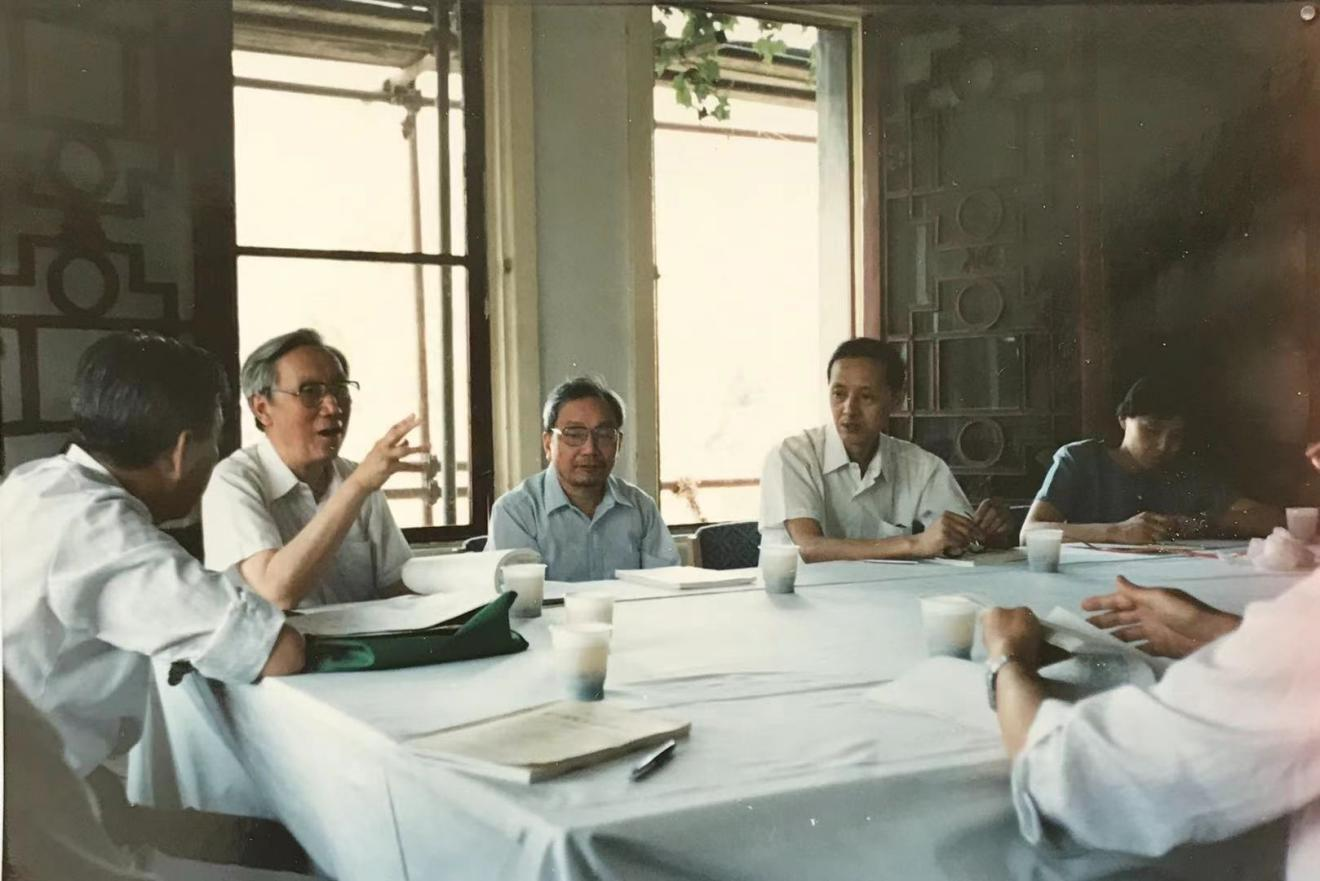
Yunjia Wang’s Ph.D dissertation defense at Jingyuan Courtyard 5. From left, Professor Tao Lin, Professor Tongqiang Xu (deceased), Professor Jiong Shen (deceased), and the dissertation defense secretary Mingming Gao (at the time a Ph.D student in the Department of Chinese Language and Literature and now a faculty member in the Department of English Language and Literature)
Q: Have you returned to Jingyuan since you moved to Lee Shau Kee Humanities Hall?
A: I haven’t planned to visit because I’m not sure if we are allowed in yet. Still, sometimes, especially in spring, I’d like to go to the Shaoyuan canteen, or take a walk in Jingyuan with my colleagues. Those who have gotten their bachelor’s degree and worked here may have spent more time in Jingyuan than I have. Yet, I suppose that I might be the only one who has had the experience of spending every night alone in the room in Jingyuan 5 while working on my Ph.D thesis.
Q: On BBS, some students claimed that “in Jingyuan lies the core spirit of Peking University” since it has been the base of departments of Chinese, history, and philosophy. What do you think that spirit is?
A: I don’t think it’s a good idea to sanctify certain things or attach too many meanings to some places. Just as you can see similar old buildings in other areas in Peking University, (previously as the campus of Yenching University), I would say that Peking University also has advantages in fields other than arts such as science.
My affection for Peking University and the Yenching University springs from how people like my old tutor stuck to their beliefs and kept doing research rigorously. Whatever adverse environments they were in, they maintained a high academic standard, which to this day I have always respected and been inspired to follow. I passed these legacies to my students and told them that we should set up and keep a high standard for the quality of our research, instead of only aiming to publish more papers. Once setting the goal, we should spare no effort to make it perfect.
I still remember that my kind tutor once came to me in a rage when I prepared for the thesis defense because he had just found a time error in the citations. He told me that one insignificant error could easily undermine the author’s credit. Though he had retired at the time, he painstakingly reviewed every word, every punctuation, and each citation in our theses. I always keep this memory close to my heart, as one of the aspects of my experiences in Jingyuan and Peking University.
